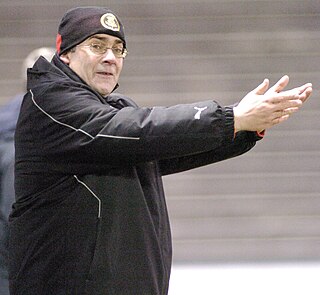Related Research Articles
James Callaghan "Chic" Charnley is a Scottish former football player and coach. Charnley's playing career lasted nearly 20 years, with spells at Hamilton Academical, St Mirren, Hibernian and Dundee, however he is perhaps best known for his numerous spells at Partick Thistle. He also was a coach at Thistle for a short time and was briefly assistant manager of Clyde. Throughout his career, Charnley had a reputation as being a hot-head; he was sent off 17 times in a senior career which lasted for nearly 20 years.

Ian Holland McCall is a Scottish former football player and coach. During his playing days McCall played for Queen's Park, Dunfermline Athletic, Rangers, Bradford City, Dundee, Falkirk, Hamilton Academical, Happy Valley, Partick Thistle and Clydebank.
Kilbowie Park, also known as New Kilbowie Park, was a football stadium in Clydebank, Scotland. It was the home ground of Clydebank.

David John Irons is a Scottish former football player and coach.
Adam Strachan was a Scottish professional footballer. Strachan came through the youth system at Partick Thistle and played 111 matches for the senior side, including a season in the Scottish Premier League. After leaving The Jags, Strachan played in the Scottish Football League with Ross County, Dumbarton, Albion Rovers, Clyde, Stenhousemuir and Arbroath, as well as in Junior football with Clydebank, Irvine Meadow and Glenafton Athletic.
James Grady is a Scottish former footballer who spent the majority of his career in the top two divisions in Scottish football. He played as a striker, and became player/manager for Greenock Morton in the First Division between 2009 and 2010.
Alistair Slowey Graham is a Scottish former professional footballer who played as a striker.
Andrew Gerard Murdoch is a Scottish former footballer, who played as a goalkeeper for Celtic, Partick Thistle and Hamilton Academical.
Tommy Bryce is a Scottish former footballer. Bryce had a playing career spanning 21 seasons from 1980–81 with Scottish Football League clubs Kilmarnock, Stranraer, Queen of the South, Clydebank, Ayr United and Arbroath.
Robert"Nobby"Clark is a Scottish former professional footballer who played for Partick Thistle and then served Queen of the South as both player and manager.
Kieran Burns is a professional footballer who plays as a forward for Clydebank in the Scottish Junior Football Association, West Region.
William "Budgie" McGhie is a Scottish former footballer who played as a defender for three clubs in the Scottish Football League. He is currently the assistant manager of Pollok.
Season 1975–76 was the 92nd football season in which Dumbarton competed at a Scottish national level, entering the Scottish Football League for the 70th time, the Scottish Cup for the 81st time and the Scottish League Cup for the 29th time.
Season 1977–78 was the 94th football season in which Dumbarton competed at a Scottish national level, entering the Scottish Football League for the 72nd time, the Scottish Cup for the 83rd time, and the Scottish League Cup for the 31st time.
Season 1978–79 was the 95th football season in which Dumbarton competed at a Scottish national level, entering the Scottish Football League for the 73rd time, the Scottish Cup for the 84th time and the Scottish League Cup for the 32nd time.
Season 1981–82 was the 98th football season in which Dumbarton competed at a Scottish national level, entering the Scottish Football League for the 76th time, the Scottish Cup for the 87th time and the Scottish League Cup for the 35th time.
Season 1982–83 was the 99th football season in which Dumbarton competed at a Scottish national level, entering the Scottish Football League for the 77th time, the Scottish Cup for the 88th time and the Scottish League Cup for the 36th time.
Season 1983–84 was the 100th football season in which Dumbarton competed at a Scottish national level, entering the Scottish Football League for the 78th time, the Scottish Cup for the 89th time and the Scottish League Cup for the 37th time.
Season 1987–88 was the 104th football season in which Dumbarton competed at a Scottish national level, entering the Scottish Football League for the 82nd time, the Scottish Cup for the 93rd time and the Scottish League Cup for the 41st time.
Clydebank Football Club was a Scottish football club based in the town of Clydebank, West Dunbartonshire. The fourth entity to carry the name, Clydebank were formed in 1965 following the relocation of East Stirlingshire Clydebank F.C., a club formed by a contentious merger of Clydebank Juniors and East Stirlingshire in 1964 to bring a with the intention of creating a senior club for the town; this arrangement lasted only one year before East Stirlingshire continued alone as before and a new Clydebank team was formed. Playing their home games at Kilbowie Park, they were elected to the Scottish Football League in 1966. Clydebank had two short spells in the Scottish Premier Division, and reached the semi-final of the Scottish Cup in 1990, whilst a First Division club.
References
- ↑ "Clydebank 7–1 Partick Thistle". Bankies Archive.
